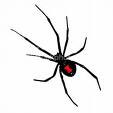Davis Pest Control, Spider Pest Control, Black Widow DavisBlack Widow Spider Davis
 The typical adult female black widow has a shiny black body, slender black legs, and a red or orange mark in the shape of an hourglass on the underside of the large, round abdomen. The adult male black widow is one-half to two-thirds the length of the female, has a smaller abdomen, and is seldom recognized as a black widow. The topside of its abdomen is greenish gray with a pattern of cream-colored areas and one light-colored band going lengthwise down the middle. The hourglass mark on the underside of the abdomen typically is yellow or yellow-orange and broad in the middle. The legs are banded with alternating light and dark areas. Like males, young female black widow spiders are patterned on the top side. In the early stages they resemble males, but gradually acquire the typical female coloration with each molt. In intermediate stages they have tan or cream-colored, olive gray, and orange markings on the topside of the abdomen, a yellowish orange hourglass mark on the underside and banded legs. The egg sacs are mostly spherical, about 1/2 inch long and 5/8 inch in diameter, creamy yellow to light tan in color, opaque, and tough and paperlike on the surface. A female may produce several egg sacs during her lifetime, which can be 2 years. Tiny, young black widows, which are nearly white in color, emerge from the egg sac and remain close together during the first days after emergence, often preying on each other. Soon afterwards, the spiderlings disperse to new locations by \'ballooning\' on light silken thread and infest new areas. Webbing produced by black widow spiders is very strong compared to other spider webbing. The typical adult female black widow has a shiny black body, slender black legs, and a red or orange mark in the shape of an hourglass on the underside of the large, round abdomen. The adult male black widow is one-half to two-thirds the length of the female, has a smaller abdomen, and is seldom recognized as a black widow. The topside of its abdomen is greenish gray with a pattern of cream-colored areas and one light-colored band going lengthwise down the middle. The hourglass mark on the underside of the abdomen typically is yellow or yellow-orange and broad in the middle. The legs are banded with alternating light and dark areas. Like males, young female black widow spiders are patterned on the top side. In the early stages they resemble males, but gradually acquire the typical female coloration with each molt. In intermediate stages they have tan or cream-colored, olive gray, and orange markings on the topside of the abdomen, a yellowish orange hourglass mark on the underside and banded legs. The egg sacs are mostly spherical, about 1/2 inch long and 5/8 inch in diameter, creamy yellow to light tan in color, opaque, and tough and paperlike on the surface. A female may produce several egg sacs during her lifetime, which can be 2 years. Tiny, young black widows, which are nearly white in color, emerge from the egg sac and remain close together during the first days after emergence, often preying on each other. Soon afterwards, the spiderlings disperse to new locations by \'ballooning\' on light silken thread and infest new areas. Webbing produced by black widow spiders is very strong compared to other spider webbing.
Brown Recluse Spider Davis

Brown recluse spiders have a characteristic dark brown violin marking on their back.
http://www.ento.okstate.edu/ddd/insects/wolfspider.htm Wolf Spiders Davis - Pest Control Davis

Habitat: Common household pest in the fall when they are looking for a warm place to overwinter. They are commonly found around doors, windows, house plants, basements, garages, and in almost all terrestrial habitats. They do not spin a web but roam at night to hunt for food. Wolf spiders are often confused with the brown recluse, but they lack the unmistakable violin-shaped marking behind the head. The wolf spider is shy and seeks to run away when disturbed. Description: Wolf spiders range from about 1/2 inch to 2 inches in length, hairy, and are typically brown to gray in color with various markings or lines. Wolf spider mothers carry their large egg sacs around with them. When the young spiderlings hatch they climb onto their mother's back and ride around until partially grown. Wolf spiders are not poisonous, though as with all spiders, bites may cause reactions in certain individuals.
|